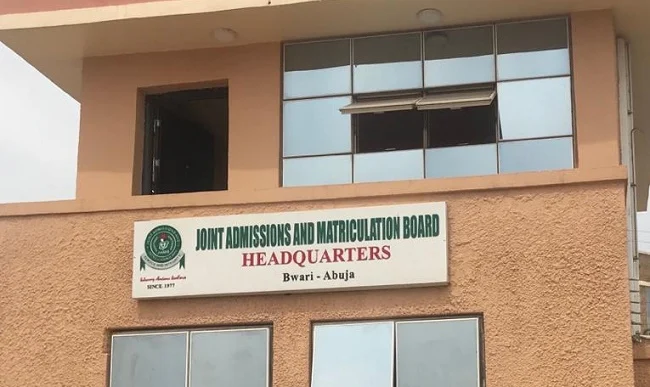JAMB headquarters
BY YISA USMAN
The recent walkout by representatives of the Joint Admissions and Matriculation Board (JAMB) during a public hearing of the House Committee on Basic Education has reignited national concerns over governance, transparency, and institutional accountability within one of Nigeria’s most visible public agencies. The delegation, led by Mufutau Bello, who stood in for the registrar, Prof. Ishaq Oloyede, staged a walkout after lawmakers rejected his request for a closed-door session. The incident, widely viewed as an act of disregard for legislative oversight, typifies the growing culture of secrecy and self-assertion that many believe now defines the institution’s internal ethos.
JAMB, a public agency established by law, is duty-bound to manage its finances with transparency and accountability. Yet its tendency to shield financial matters from public scrutiny runs contrary to these principles, especially given the substantial revenues it collects annually from candidates and other service users. Nigerians, whose children and wards contribute these funds, have a legitimate right to know how they are utilised.
The revenue sources of JAMB range from UTME and Direct Entry registrations to condonement, inter-university transfers, corrections of personal data, and enrolment for open university, part-time, and sandwich programmes. Altogether, about 18 categories of fees make up JAMB’s internally generated revenue. With such a vast income base, the public expectation for transparency in expenditure is both reasonable and necessary.
Advertisement
However, recent scrutiny of the Board’s budget exposed several questionable provisions. Lawmakers queried allocations in the 2025 budget for staff feeding estimated at ₦1.1 billion, a ₦1 billion housing scheme, inflated security and cleaning costs of ₦850 million, and corporate social responsibility projects that appear to benefit a select few institutions. These spending patterns, which disregard government cost-control policies such as the monetisation directive, reflect weak governance and a troubling indifference to fiscal discipline.
Concerns have also been raised regarding certain administrative practices in JAMB’s management structure, particularly relating to staff deployment, tenure observance, and representation in sensitive financial matters. Questions surrounding adherence to established public service regulations and tenure limits deserve closer examination by the relevant authorities. These issues are not merely about individuals but about ensuring that institutional processes remain transparent, consistent, and compliant with the Public Service Rules and the Code of Conduct for Public Officers.
Available records indicate that some officials have served in various capacities across institutions and later assumed leadership roles within JAMB through processes said to have been facilitated under existing secondment provisions of the Public Service Rules. However, these arrangements appear to have extended beyond the standard timelines prescribed for such postings, thereby necessitating official clarification. Where such extensions occur, they should be adequately justified and approved through due administrative channels to avoid the perception of irregularity or favouritism.
Advertisement
Equally noteworthy is the manner of representation at the recent House Committee hearing, where an official who had previously overseen financial operations led the JAMB delegation, despite the existence of a current Director of Finance and Accounts. While this may have been an internal administrative decision, it has nonetheless created public speculation about role clarity and decision-making processes within the agency’s finance and accounts department. Such concerns highlight the importance of clear succession planning, defined responsibilities, and transparent reporting lines in safeguarding institutional credibility.
These governance questions are compounded by the absence of a substantive Governing Board for JAMB since 2021. The lack of this statutory oversight body has effectively concentrated decision-making powers in the Registrar’s office and a few senior aides. Without an active Board to review and approve key policies, procurement, and financial matters, there is an inevitable weakening of institutional checks and balances. Restoring the Governing Board would therefore be a positive step toward reinforcing accountability and ensuring that no single office wields disproportionate control over public resources.
It is equally troubling that during the recent hearing, the Board’s representative justified his preference for a closed-door session by citing the involvement of the honourable minister of education. If indeed the minister’s office was invoked as a basis for avoiding public discussion, then it signals an unhealthy conflation of ministerial oversight with institutional shielding. While ministries are empowered to supervise agencies under their purview, such supervision should not translate into secrecy, especially in legislative matters meant to ensure transparency in the use of public funds.
As someone who has, in the past, drawn attention to similar irregularities through formal submissions to the Independent Corrupt Practices and Other Related Offences Commission (ICPC) and other oversight bodies, it is evident that the challenges at JAMB are deep-rooted and systemic. My earlier disclosures highlighted procedural and administrative inconsistencies that appear to persist, as recent events suggest. While those efforts were met with reprisals rather than reforms, the unfolding controversies now reinforce the call for institutional correction and greater accountability.
Advertisement
It is time for the Federal Government to take a deeper interest in JAMB’s internal governance, beyond the annual conduct of examinations and remittances to the treasury. With its dual funding structure, receiving both government subventions and massive internally generated revenues, JAMB must be subjected to regular, independent, and transparent audits. Nigerians must know not only how much the agency remits to the treasury but also how it spends the portion of funds it retains. A comprehensive forensic audit of JAMB’s finances and administrative practices since 2016 by any of the Big-4 audit firms is therefore necessary to restore confidence, enforce discipline, and realign the institution with its founding principles.
JAMB’s credibility depends on openness and accountability. The funds it manages belong to the Nigerian people, particularly the millions of young candidates and families who make significant sacrifices each year to pay its fees. Mismanagement of these funds represents not just fiscal irresponsibility but moral failure. The recent parliamentary incident, while regrettable, presents an opportunity for both the government and the legislature to confront the deeper governance deficits within JAMB. It is time for the agency to return to its core values of transparency, fairness, and service to the Nigerian public. For an institution that shapes the academic future of the nation’s youth, nothing short of full accountability and integrity will suffice.
Yisa Usman is a fellow of the Institute of Chartered Accountants of Nigeria (ICAN) and the Chartered Institute of Taxation of Nigeria (CITN).
Advertisement
Views expressed by contributors are strictly personal and not of TheCable.



